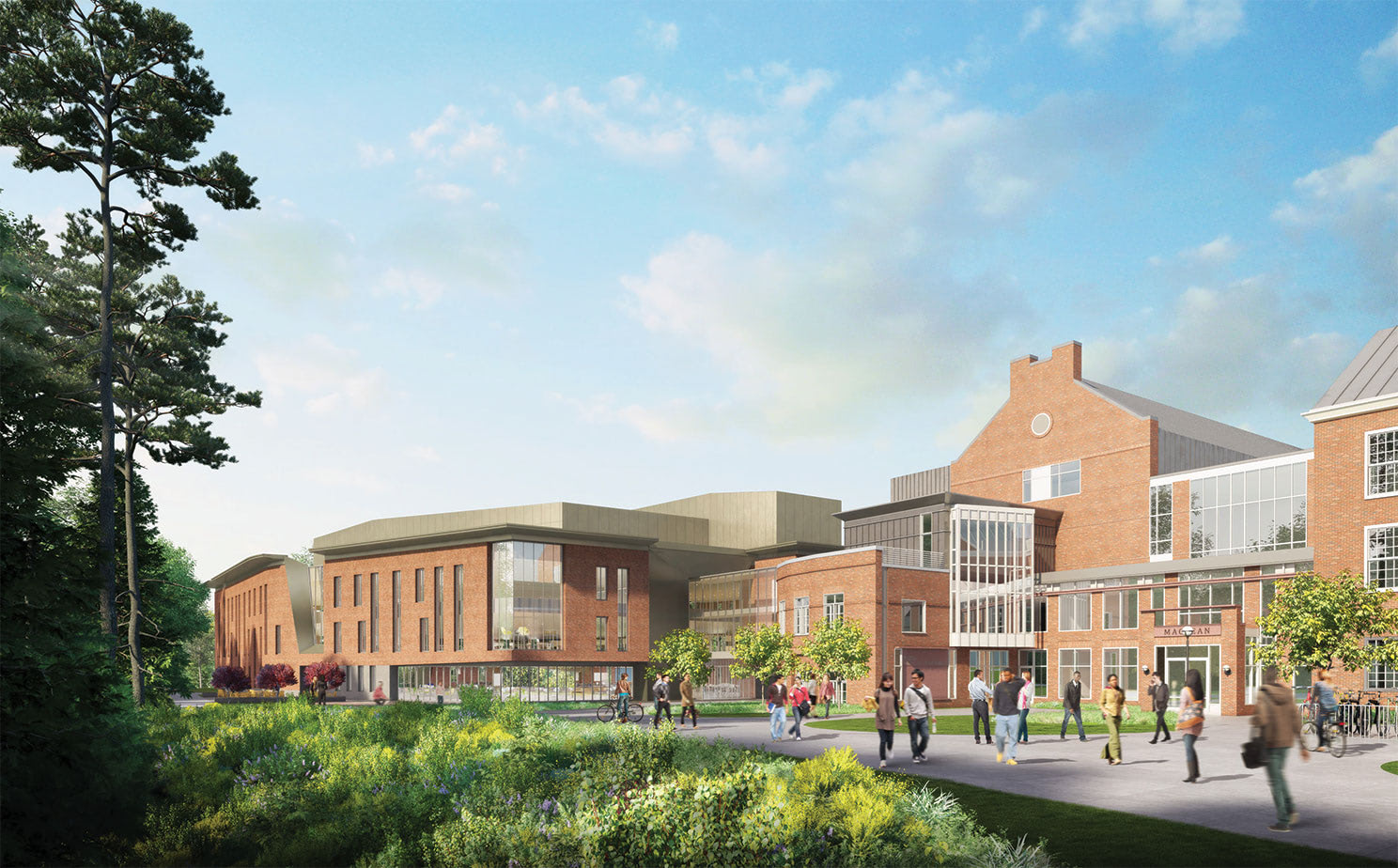- Undergraduate
Bachelor's Degrees
Bachelor of ArtsBachelor of EngineeringPartner School Dual-DegreeUndergraduate AdmissionsUndergraduate Experience
- Graduate
Doctoral Degrees
Doctor of PhilosophyPhD Innovation ProgramDoctor of Medicine-PhDGraduate AdmissionsGraduate Experience
- Research
- Entrepreneurship
- Community
- About
-
All Thayer News
Dartmouth Launches Capital Campaign
Apr 27, 2018
Dartmouth has announced the launch of a $3 billion capital campaign, The Call to Lead, which includes plans to transform the west end of campus into a hub of technological and entrepreneurial innovation.
The campaign includes $250 million to integrate engineering and computer science, expand both faculties to be able to teach more students, and construct a new state-of-the-art building to house engineering, computer science, the Digital Arts, Leadership & Innovation (DALI) Lab, and the Center for Entrepreneurship.
These initiatives come at a time when 70 percent of Dartmouth undergraduates take at least one engineering or computer science course and demand continues to rise among both men and women. In 2016 Thayer graduated a majority female undergraduate engineering class—a national first.
It is also a time of convergence between the physical and digital worlds—an era that the National Academy of Engineering and others call the “Fourth Industrial Revolution.”
“Now is the time for engineering and computer science to dissolve the artificial boundary between the computational and the physical worlds,” says Thayer School Dean Joseph J. Helble.
“Computer science and engineering have collided, and digital technology is being integrated into everything from toasters to self-driving cars. Our students must be trained in these two worlds,” says Professor Hany Farid, chair of computer science.
Thayer School and computer science plan to seamlessly integrate their programs in their new 160,000-gross-square-foot building, which will occupy land now used for parking. Linked to MacLean Engineering Sciences Center, the new building will architecturally express the spatial and programmatic intermixing of engineering, computer science, and entrepreneurship, with open vistas, fully shared facilities, and thematic rather than departmental groupings. Classrooms, project rooms, labs, and offices will be thoughtfully interspersed, continuing a proven Thayer School strategy for sparking collaboration and fostering a keen sense of community.

Thematic research neighborhoods will unite computer science and engineering faculty and students working on innovations in advanced materials, biotechnology,emerging technologies, energy technology, machine Intelligence, mobile X, and security and privacy. A new electron microscope center will be located in the building to support research.
The new building will feature spaces for active learning, including project labs, maker spaces, a Technology-Enabled Active Learning (TEAL) classroom, and the Digital Arts, Leadership & Innovation (DALI) Lab. Complementing Thayer’s existing project design labs and machine shop, these new flexible spaces will allow more courses to feature hands-on design, fabrication, and problem-solving experiences, giving computer science and engineering majors—and students from across Dartmouth’s curricular spectrum—an unsurpassed environment for learning by doing.
Entrepreneurial resources will also be integrated into the building. The Center for Entrepreneurship, previously known as the Dartmouth Entrepreneurial Network will move from its current location near the Hopkins Center. The move to the new building will allow students and faculty to benefit from entrepreneurial expertise at Tuck School of Business and at Thayer—where a third of the engineering faculty have already founded companies that are turning research findings into applied technologies to improve the lives of people worldwide.
The increased space will enable student and faculty growth. The tenure-track engineering faculty will increase from 35 to 70 and the computer science faculty from 18 to 27 over the next 10 years to build the capacity to educate all undergraduates and many more graduate students.
The transformation of the west end of campus will also include new programs at Tuck School of Business and construction of the Arthur L. Irving Institute for Energy and Society between Tuck and Thayer.
The overarching goal of The Call to Lead is to expand Dartmouth’s commitment to creating positive, global change. “We will strengthen our ability to educate future leaders who possess an array of cross-disciplinary skills and an unrivaled ability to study complex problems from multiple perspectives,” says Dartmouth President Phil Hanlon ’77.
For contacts and other media information visit our Media Resources page.
